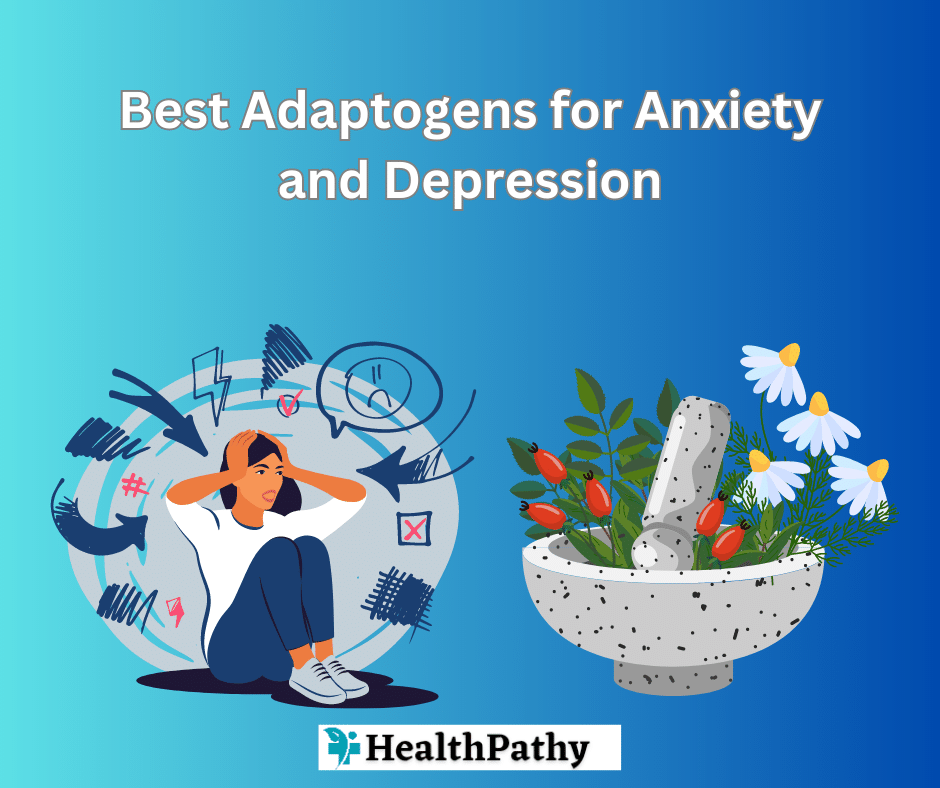Best Adaptogens for Anxiety and Depression

In today’s fast-paced and demanding world, anxiety and depression have become prevalent mental health issues affecting millions of people worldwide. While conventional treatments like medication and therapy play a vital role in managing these conditions, there is growing interest in alternative approaches that address the root causes and promote holistic well-being. Adaptogens, a group of natural substances with stress-reducing properties, have emerged as a promising avenue for alleviating symptoms of anxiety and depression. In this comprehensive article, we will delve deeper into the best adaptogens and their mechanisms in providing relief for those grappling with these mental health challenges.
Adaptogens:
Adaptogens are a class of herbal compounds used for centuries in traditional medicine systems like Ayurveda, Traditional Chinese Medicine (TCM), and indigenous practices. The term “adaptogen” was coined by Russian scientist Dr. Nikolai Lazarev in the 1940s to describe substances that help the body adapt to stressors, whether physical, emotional, or environmental.
One of the primary ways adaptogens work is by modulating the body’s stress response, primarily through the regulation of the hypothalamic-pituitary-adrenal (HPA) axis. This axis plays a pivotal role in the body’s response to stress, and adaptogens work to balance stress hormone levels, particularly cortisol, which is often elevated in individuals experiencing anxiety and depression.
Rhodiola Rosea: Nature’s Golden Root
Rhodiola Rosea, commonly known as “golden root” or “arctic root,” is a perennial herb native to regions with cold climates, such as the Arctic and mountainous areas of Europe and Asia. In traditional medicine, Rhodiola has been used to combat fatigue, increase stamina, and enhance resilience.
Studies have indicated that Rhodiola can have a positive impact on anxiety and depression due to its ability to modulate neurotransmitter levels. By increasing the availability of serotonin and dopamine, two crucial neurotransmitters associated with mood regulation, Rhodiola promotes feelings of well-being and emotional stability.
Ashwagandha: The Stress Buster
Ashwagandha, also known as “Indian ginseng” or “winter cherry,” is one of the most well-known adaptogens in Ayurvedic medicine. It has a rich history of use and is regarded as a rejuvenating herb for the mind and body.
Research on ashwagandha suggests that it can reduce cortisol levels, which helps the body manage stress more effectively. By supporting the adrenal glands, ashwagandha can enhance the body’s ability to cope with stressors. This leads to reduced feelings of anxiety and depression.
Furthermore, ashwagandha’s anti-inflammatory properties may be beneficial in reducing inflammation that can contribute to mood disorders.
Holy Basil (Tulsi): The Sacred Herb
Holy Basil, or Tulsi, is revered in Indian culture and traditional medicine. It is considered a sacred plant and is often grown in temple courtyards. Holy Basil is revered for its ability to promote spiritual, emotional, and physical well-being.
As an adaptogen, Holy Basil acts as a natural stress reliever by normalizing cortisol levels and balancing neurotransmitters. Its antioxidant and anti-inflammatory properties also contribute to overall brain health, protecting the brain from oxidative stress and damage.
Passionflower: A Calming Presence
Passionflower is a gentle yet effective adaptogen commonly used to alleviate anxiety and insomnia. Native to North and South America, this beautiful flowering vine has a long history of use among indigenous tribes.
The calming effects of passionflower are attributed to its ability to increase gamma-aminobutyric acid (GABA) in the brain. GABA is an inhibitory neurotransmitter that reduces the activity of brain cells, leading to relaxation and reduced anxious thoughts. Passionflower is particularly helpful for individuals experiencing restlessness or irritability due to anxiety.
Siberian Ginseng (Eleuthero): The Endurance Enhancer
Despite its name, Siberian Ginseng, or Eleuthero, is not a true ginseng. However, it shares similar adaptogenic properties with other ginseng species. Native to Siberia and parts of Asia, Eleuthero has been used in Traditional Chinese Medicine to promote longevity and resilience.
Eleuthero’s adaptogenic effects can enhance the body’s resistance to stress, fatigue, and mental exhaustion. By supporting the adrenal glands and immune system, Eleuthero may help combat symptoms of depression and boost overall emotional well-being.
Mucuna Pruriens: The Mood Elevator
Mucuna Pruriens, also known as velvet bean. It is a tropical legume that has been used in traditional Ayurvedic medicine for its mood-enhancing properties. It contains a natural compound called L-dopa, a precursor to dopamine, a neurotransmitter associated with pleasure and motivation.
By increasing dopamine levels, mucuna pruriens may help alleviate symptoms of depression and improve motivation and feelings of pleasure. It can also have a positive impact on stress management, as dopamine is essential for regulating mood and emotions.
Summary:
The journey to healing from anxiety and depression can be multifaceted, and adaptogens offer a natural and holistic approach to support mental well-being. These incredible herbal allies have withstood the test of time and continue to gain recognition for their stress-reducing properties.
It is important to remember that individual responses to adaptogens may vary, and they should not be considered a replacement for professional medical advice or treatment. Always consult with a qualified healthcare provider before incorporating adaptogens into your wellness routine.
Alongside adaptogens, consider adopting a holistic approach to mental health, which includes regular exercise, a balanced diet, sufficient sleep, mindfulness practices, and seeking professional support when needed. By taking proactive steps toward mental wellness, individuals can embark on a path of healing and find balance and peace.
Related Article:



Follow us:





